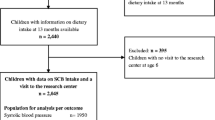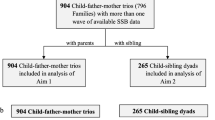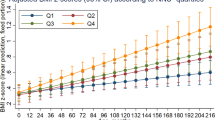Abstract
Objectives
A woman’s food choices during pregnancy may be associated with her offspring’s food choices. Several studies support an association between childhood sugary beverage (SB) consumption and poor cardiometabolic health. This study aimed to assess the association of maternal SB consumption during pregnancy and later, with her offspring’s SB consumption in early infancy and childhood.
Methods
A total of 1945 women and 1595 children participating in 3 Canadian studies reported SB consumption during pregnancy, at 2 years of age, and/or at school age (5 to 8 years old). Mother and offspring SB intakes were self-reported by mothers. Multivariable linear regression analyses were conducted within each cohort and cohort data were combined using fixed effect meta-analyses.
Results
Maternal SB consumption during pregnancy was associated with higher offspring SB consumption at 2 years of age (standardized β = 0.19 predicted change in the number of standard deviations of offspring SB intake for an increase of 1 standard deviation in maternal serving [95% CI: 0.16 to 0.22]). Concurrent maternal SB consumption was associated with higher offspring SB intake when children were aged 5 to 8 years (standardized β= 0.25 [95% CI: 0.10 to 0.40]).
Conclusion
Maternal SB consumption during pregnancy is associated with a marginally higher SB intake among their offspring at age 2, and concurrent maternal consumption is associated with a higher SB intake among school-aged offspring (5 to 8 years old). Future interventions tailored for pregnancy and early childrearing years to reduce SB intakes of mothers may reduce young children’s SB intake.
Résumé
Objectifs
Il peut y avoir un lien entre les choix alimentaires d’une femme pendant la grossesse et ceux de son enfant. Plusieurs études font état d’une association entre la consommation de boissons sucrées (BS) durant l’enfance et la mauvaise santé cardiométabolique. Notre étude visait à évaluer l’association entre la consommation de BS des mères pendant et après la grossesse et la consommation de BS de leurs enfants durant la petite enfance et l’enfance.
Méthode
En tout, 1 945 femmes et 1 595 enfants participant à 3 études canadiennes ont fait état de leur consommation de BS pendant la grossesse, à l’âge de 2 ans et/ou à l’âge scolaire (5 à 8 ans). La consommation de BS des mères et des enfants a été déclarée par les mères. Des analyses de régression linéaire multivariée ont été menées dans chaque cohorte, et les données des cohortes ont été combinées à l’aide de méta-analyses à effets fixes.
Résultats
La consommation maternelle de BS pendant la grossesse était associée à une consommation de BS plus élevée chez les enfants à l’âge de 2 ans (le coefficient β standardisé = 0,19 prédisait le changement du nombre d’écart-types de consommation de BS chez les enfants pour chaque hausse de 1 écart-type de la portion maternelle [IC de 95 % : 0,16 à 0,22]). La consommation maternelle concomitante de BS était associée à une consommation de BS plus élevée chez les enfants lorsqu’ils étaient âgés de 5 à 8 ans (coefficient β standardisé = 0,25 [IC de 95 % : 0,10 à 0,40]).
Conclusion
La consommation maternelle de BS pendant la grossesse est associée à une consommation de BS marginalement plus élevée chez l’enfant à l’âge de 2 ans, et la consommation maternelle concomitante est associée à une consommation de BS plus élevée chez l’enfant d’âge scolaire (5 à 8 ans). De futures interventions visant à réduire la consommation de BS des mères pendant la grossesse et durant les premières années où elles élèvent leurs enfants pourraient réduire la consommation de BS des jeunes enfants.


Similar content being viewed by others
Data availability
Data collection forms and other raw data can be shared upon reasonable request.
References
Anand, S. S., Vasudevan, A., Gupta, M., Morrison, K., Kurpad, A., Teo, K. K., Srinivasan, K., & Investigators, S. C. S. (2013). Rationale and design of South Asian Birth Cohort (START): A Canada-India collaborative study. BMC Public Health, 13, 79. https://doi.org/10.1186/1471-2458-13-79
Anand, S. S., Gupta, M. K., Schulze, K. M., Desai, D., Abdalla, N., Wahi, G., Wade, C., Scheufler, P., McDonald, S. D., Morrison, K. M., Vasudevan, A., Dwarakanath, P., Srinivasan, K., Kurpad, A., Gerstein, H. C., & Teo, K. K. (2016). What accounts for ethnic differences in newborn skinfold thickness comparing South Asians and White Caucasians? Findings from the START and FAMILY birth cohorts. International Journal of Obesity, 40(2), 239–244. https://doi.org/10.1038/ijo.2015.171
Ashman, A. M., Collins, C. E., Hure, A. J., Jensen, M., & Oldmeadow, C. (2016). Maternal diet during early childhood, but not pregnancy, predicts diet quality and fruit and vegetable acceptance in offspring. Maternal & Child Nutrition, 12(3), 579–590. https://doi.org/10.1111/mcn.12151
Banerjee, A. T., Flora, P. K., Stone, M., & Faulkner, G. (2015). Differences in the prevalence of overweight between 10-12-year-old South Asian and non-South Asian children in Toronto, Ontario: Findings from Project BEAT. Journal of Racial and Ethnic Health Disparities, 2(2), 184–191. https://doi.org/10.1007/s40615-014-0062-y
Bjerregaard, A. A., Halldorsson, T. I., Tetens, I., & Olsen, S. F. (2019). Mother’s dietary quality during pregnancy and offspring’s dietary quality in adolescence: Follow-up from a national birth cohort study of 19,582 mother-offspring pairs. PLoS Medicine, 16(9), e1002911. https://doi.org/10.1371/journal.pmed.1002911
Bleich, S. N., & Vercammen, K. A. (2018). The negative impact of sugar-sweetened beverages on children’s health: An update of the literature. BMC Obesity, 5, 6. https://doi.org/10.1186/s40608-017-0178-9
Bogart, L. M., Elliott, M. N., Ober, A. J., Klein, D. J., Hawes-Dawson, J., Cowgill, B. O., Uyeda, K., & Schuster, M. A. (2017). Home sweet home: Parent and home environmental factors in adolescent consumption of sugar-sweetened beverages. Academic Pediatrics, 17(5), 529–536. https://doi.org/10.1016/j.acap.2017.01.015
Cornelius, M. D., Leech, S. L., Goldschmidt, L., & Day, N. L. (2005). Is prenatal tobacco exposure a risk factor for early adolescent smoking? A follow-up study. Neurotoxicology and Teratology, 27(4), 667–676. https://doi.org/10.1016/j.ntt.2005.05.006
Diamant, A. L., Babey, S. H., Jones, M., & Brown, E. R. (2009). Teen dietary habits related to those of parents. Policy Brief UCLA Cent Health Policy Res (PB2009-2), 1-6. https://www.ncbi.nlm.nih.gov/pubmed/19288625. Accessed 26 Jun 2021.
Fulgoni 3rd, V. L., & Quann, E. E. (2012). National trends in beverage consumption in children from birth to 5 years: Analysis of NHANES across three decades. Nutrition Journal, 11, 92. https://doi.org/10.1186/1475-2891-11-92
Gui, Z., Huang, S., Chen, Y., Zhao, Y., Jiang, N., Zhang, S., & Chen, Y. (2021). Association between sugar-sweetened beverage consumption and executive function in children. Nutrients, 13(12). https://doi.org/10.3390/nu13124563
Hales, C. N., & Barker, D. J. (1992). Type 2 (non-insulin-dependent) diabetes mellitus: The thrifty phenotype hypothesis. Diabetologia, 35(7), 595–601. https://doi.org/10.1007/bf00400248
Hausner, H., Nicklaus, S., Issanchou, S., Molgaard, C., & Moller, P. (2010). Breastfeeding facilitates acceptance of a novel dietary flavour compound. Clinical Nutrition, 29(1), 141–148. https://doi.org/10.1016/j.clnu.2009.11.007
Hudda, M. T., Nightingale, C. M., Donin, A. S., Owen, C. G., Rudnicka, A. R., Wells, J. C. K., Rutter, H., Cook, D. G., & Whincup, P. H. (2018). Patterns of childhood body mass index (BMI), overweight and obesity in South Asian and black participants in the English National child measurement programme: Effect of applying BMI adjustments standardising for ethnic differences in BMI-body fatness associations. International Journal of Obesity, 42(4), 662–670. https://doi.org/10.1038/ijo.2017.272
IBM Corp. (2017). IBM SPSS Statistics for Macintosh, Version 25.0. IBM Corp.
Jones, A. C., Veerman, J. L., & Hammond, D. (2017). The health and economic impact of a tax on sugary drinks in Canada. University of Waterloo.
Jones, A. C., Kirkpatrick, S. I., & Hammond, D. (2019). Beverage consumption and energy intake among Canadians: Analyses of 2004 and 2015 national dietary intake data. Nutrition Journal, 18(1), 60. https://doi.org/10.1186/s12937-019-0488-5
Krishnaveni, G. V., Veena, S. R., Hill, J. C., Kehoe, S., Karat, S. C., & Fall, C. H. (2010). Intrauterine exposure to maternal diabetes is associated with higher adiposity and insulin resistance and clustering of cardiovascular risk markers in Indian children. Diabetes Care, 33(2), 402–404. https://doi.org/10.2337/dc09-1393
Lesser, I. A., Gasevic, D., & Lear, S. A. (2014). The association between acculturation and dietary patterns of South Asian immigrants. PLoS One, 9(2), e88495. https://doi.org/10.1371/journal.pone.0088495
Lim, S., Hill, B., Pirotta, S., O'Reilly, S., & Moran, L. (2020). What are the most effective behavioural strategies in changing postpartum women’s physical activity and healthy eating behaviours? A systematic review and meta-analysis. Journal of Clinical Medicine, 9(1). https://doi.org/10.3390/jcm9010237
Litwin, S. E. (2014). Childhood obesity and adulthood cardiovascular disease: Quantifying the lifetime cumulative burden of cardiovascular risk factors. Journal of the American College of Cardiology, 64(15), 1588–1590. https://doi.org/10.1016/j.jacc.2014.07.962
Luger, M., Lafontan, M., Bes-Rastrollo, M., Winzer, E., Yumuk, V., & Farpour-Lambert, N. (2017). Sugar-sweetened beverages and weight gain in children and adults: A systematic review from 2013 to 2015 and a comparison with previous studies. Obesity Facts, 10(6), 674–693. https://doi.org/10.1159/000484566
Malik, V. S., Li, Y., Pan, A., De Koning, L., Schernhammer, E., Willett, W. C., & Hu, F. B. (2019). Long-term consumption of sugar-sweetened and artificially sweetened beverages and risk of mortality in US adults. Circulation, 139(18), 2113–2125. https://doi.org/10.1161/CIRCULATIONAHA.118.037401
Martin, C. L., Siega-Riz, A. M., Sotres-Alvarez, D., Robinson, W. R., Daniels, J. L., Perrin, E. M., & Stuebe, A. M. (2016). Maternal dietary patterns during pregnancy are associated with child growth in the first 3 years of life. The Journal of Nutrition, 146(11), 2281–2288. https://doi.org/10.3945/jn.116.234336
Mennella, J. A., Jagnow, C. P., & Beauchamp, G. K. (2001). Prenatal and postnatal flavor learning by human infants. Pediatrics, 107(6), E88. https://doi.org/10.1542/peds.107.6.e88
Mohamed, R. Z., Jalaludin, M. Y., & Anuar Zaini, A. (2020). Predictors of non-alcoholic fatty liver disease (NAFLD) among children with obesity. Journal of Pediatric Endocrinology & Metabolism. https://doi.org/10.1515/jpem-2019-0403
Monshouwer, K., Huizink, A. C., Harakeh, Z., Raaijmakers, Q. A., Reijneveld, S. A., Oldehinkel, A. J., Verhulst, F. C., & Vollebergh, W. A. (2011). Prenatal smoking exposure and the risk of behavioral problems and substance use in adolescence: The TRAILS study. European Addiction Research, 17(6), 342–350. https://doi.org/10.1159/000334507
Morel, K., Nichols, K., Nong, Y., Charles, N., Price, S., Taveras, E., Goldman, R., & Woo Baidal, J. A. (2019). Parental and provider perceptions of sugar-sweetened beverage interventions in the first 1000 days: A qualitative study. Academic Pediatrics, 19(7), 748–755. https://doi.org/10.1016/j.acap.2019.01.004
Morrison, K. M., Atkinson, S. A., Yusuf, S., Bourgeois, J., McDonald, S., McQueen, M. J., Persadie, R., Hunter, B., Pogue, J., Teo, K., & the FAMILY Investigators. (2009). The family atherosclerosis monitoring. In: Early life (FAMILY) study: Rationale, design, and baseline data of a study examining the early determinants of atherosclerosis. American Heart Journal, 158(4), 533–539. https://doi.org/10.1016/j.ahj.2009.07.005
Noor, S., Dehghan, M., Lear, S. A., Swaminathan, S., Ibrahim, Q., Rangarajan, S., & Punthakee, Z. (2019). Relationship between diet and acculturation among South Asian children living in Canada. Appetite, 147, 104524. https://doi.org/10.1016/j.appet.2019.104524
Pallan, M., Parry, J., Cheng, K. K., & Adab, P. (2013). Development of a childhood obesity prevention programme with a focus on UK South Asian communities. Preventive Medicine, 57(6), 948–954. https://doi.org/10.1016/j.ypmed.2013.08.025
Pan, L., Li, R., Park, S., Galuska, D. A., Sherry, B., & Freedman, D. S. (2014). A longitudinal analysis of sugar-sweetened beverage intake in infancy and obesity at 6 years. Pediatrics, 134(Suppl 1), S29–S35. https://doi.org/10.1542/peds.2014-0646F
Park, S., Onufrak, S., Sherry, B., & Blanck, H. M. (2014). The relationship between health-related knowledge and sugar-sweetened beverage intake among US adults. Journal of the Academy of Nutrition and Dietetics, 114(7), 1059–1066. https://doi.org/10.1016/j.jand.2013.11.003
Portella, A. K., Kajantie, E., Hovi, P., Desai, M., Ross, M. G., Goldani, M. Z., Roseboom, T. J., & Silveira, P. P. (2012). Effects of in utero conditions on adult feeding preferences. Journal of Developmental Origins of Health and Disease, 3(3), 140–152. https://doi.org/10.1017/S2040174412000062
Praveen, P. A., & Tandon, N. (2016). Childhood obesity and type 2 diabetes in India. WHO South East Asia J Public Health, 5(1), 17–21. https://doi.org/10.4103/2224-3151.206547
Public Health England. (2018). National Diet and Nutrition Survey. Results from years 7 and 8 (combined) of the Rolling Programme (2014/2015 to 2015/2016). https://assets.publishing.service.gov.uk/government/uploads/system/uploads/attachment_data/file/699241/NDNS_results_years_7_and_8.pdf. Accessed 15 Dec 2021.
Ruanpeng, D., Thongprayoon, C., Cheungpasitporn, W., & Harindhanavudhi, T. (2017). Sugar and artificially sweetened beverages linked to obesity: A systematic review and meta-analysis. QJM: An International Journal of Medicine, 110(8), 513–520. https://doi.org/10.1093/qjmed/hcx068
Schwingshackl, L., Hoffmann, G., Lampousi, A. M., Knuppel, S., Iqbal, K., Schwedhelm, C., Bechthold, A., Schlesinger, S., & Boeing, H. (2017). Food groups and risk of type 2 diabetes mellitus: A systematic review and meta-analysis of prospective studies. European Journal of Epidemiology, 32(5), 363–375. https://doi.org/10.1007/s10654-017-0246-y
Taylor, A. E., Howe, L. D., Heron, J. E., Ware, J. J., Hickman, M., & Munafo, M. R. (2014). Maternal smoking during pregnancy and offspring smoking initiation: Assessing the role of intrauterine exposure. Addiction, 109(6), 1013–1021. https://doi.org/10.1111/add.12514
The Nordic Cochrane Centre, T. C. C. (2014). Review MAnager (RevMan). In (Version 5.3)
Vaughn, A. E., Dearth-Wesley, T., Tabak, R. G., Bryant, M., & Ward, D. S. (2017). Development of a comprehensive assessment of food parenting practices: The home self-administered tool for environmental assessment of activity and diet family food practices survey. Journal of the Academy of Nutrition and Dietetics, 117(2), 214–227. https://doi.org/10.1016/j.jand.2016.07.021
von Elm, E., Altman, D. G., Egger, M., Pocock, S. J., Gotzsche, P. C., Vandenbroucke, J. P., & Initiative, S. (2007). The Strengthening the Reporting of Observational Studies in Epidemiology (STROBE) statement: Guidelines for reporting observational studies. Annals of Internal Medicine, 147(8), 573–577. https://doi.org/10.7326/0003-4819-147-8-200710160-00010
Wang, Y. C., Bleich, S. N., & Gortmaker, S. L. (2008). Increasing caloric contribution from sugar-sweetened beverages and 100% fruit juices among US children and adolescents, 1988-2004. Pediatrics, 121(6), e1604–e1614. https://doi.org/10.1542/peds.2007-2834
White-Barnett, O. (2017). Environmental scan of interventions aimed at decreasing sugar consumption. Toronto Public Health. https://cdn.ymaws.com/www.alphaweb.org/resource/resmgr/Environmental_Scan_REPORT_20.pdf. Accessed 28 Oct 2021.
World Health Organization. (2015). Guideline: sugars intake for adults and children. https://www.who.int/publications/i/item/9789241549028
World Health Organization. (2016). Report of the Commission on Ending Childhood Obesity. https://www.who.int/publications/i/item/9789241510066
Yajnik, C. S. (2014). Transmission of obesity-adiposity and related disorders from the mother to the baby. Annals of Nutrition & Metabolism, 64(Suppl 1), 8–17. https://doi.org/10.1159/000362608
Yee, A. Z., Lwin, M. O., & Ho, S. S. (2017). The influence of parental practices on child promotive and preventive food consumption behaviors: A systematic review and meta-analysis. International Journal of Behavioral Nutrition and Physical Activity, 14(1), 47. https://doi.org/10.1186/s12966-017-0501-3
Yoshida, Y., & Simoes, E. J. (2018). Sugar-sweetened beverage, obesity, and type 2 diabetes in children and adolescents: Policies, taxation, and programs. Current Diabetes Reports, 18(6), 31. https://doi.org/10.1007/s11892-018-1004-6
Zahid, A., Davey, C., & Reicks, M. (2017). Beverage intake among children: Associations with parent and home-related factors. International Journal of Environmental Research and Public Health, 14(8). https://doi.org/10.3390/ijerph14080929
Acknowledgements
The authors acknowledge the investigators from the START, RICH LEGACY, and FAMILY studies who raised funds and established the cohorts included in this analysis.
Code availability
Not applicable
Funding
Dr. Anand is supported by a Tier 1 Canada Research Chair in Ethnicity and Cardiovascular Disease, and the Michael G. DeGroote Heart and Stroke Foundation Chair in Population Health. The South Asian Birth Cohort (START) study data were collected as part of a bilateral program funded by the Indian Council of Medical Research/Canadian Institutes of Health Research, and Heart and Stroke Foundation of Canada. The FAMILY study is funded by grants from the CIHR and Heart and Stroke Foundation of Ontario with supplementary grants from the Population Health Research Institute. The RICH LEGACY study is funded by the Canadian Institutes of Health Research (FRN 227861) (ZP).
Author information
Authors and Affiliations
Consortia
Contributions
SSA and JL designed the research. JL conducted the research. JL and RJdS analyzed the data and performed statistical analyses. JL wrote the manuscript. SSA had primary responsibility for final content. All listed authors contributed to data collection and have read, edited, and approved the final manuscript.
Corresponding author
Ethics declarations
Ethics approval
All procedures performed in studies involving human participants were in accordance with the ethical standards of the institutions (START study: Hamilton Integrated Research Ethics Board [ID:10-640], William Osler Health System [ID:11-0001], and Trillium Health Partners [RCC: 11-018, ID: 492], March 3rd, 2011; FAMILY study: Hamilton Health Sciences [02-060], and St. Joseph’s Health Centre [05-2497]; RICH LEGACY study: The Hamilton Integrated Research Ethics Board [10-659]) and with the 1964 Helsinki declaration and its later amendments or comparable ethical standards. This article does not contain any studies with animals performed by any of the authors.
Consent to participate
Informed consent was obtained from all participants included in the study
Consent for publication
Not applicable
Conflict of interest
RJ de Souza has served as an external resource person to the World Health Organization’s Nutrition Guidelines Advisory Group on trans fats, saturated fats, and polyunsaturated fats. WHO paid for his travel and accommodation to attend meetings from the period 2012-2017 to present and discuss this work. He has presented updates of this work to WHO in 2022. He has also done contract research for the Canadian Institutes of Health Research’s (CIHR) Institute of Nutrition, Metabolism, and Diabetes, Health Canada, and WHO for which he received remuneration. He has received speaker’s fees from the University of Toronto, and McMaster Children’s Hospital. He has held grants from CIHR, Canadian Foundation for Dietetic Research, Population Health Research Institute, and Hamilton Health Sciences Corporation as a principal investigator, and is a co-investigator on several funded team grants from CIHR. He has served as an independent director of the Helderleigh Foundation (Canada). He serves as a member of the Nutrition Science Advisory Committee to Health Canada (Government of Canada), and a co-opted member of the Scientific Advisory Committee on Nutrition (SACN) Subgroup on the Framework for the Evaluation of Evidence (Public Health England).
Additional information
Publisher’s note
Springer Nature remains neutral with regard to jurisdictional claims in published maps and institutional affiliations.
Rights and permissions
Springer Nature or its licensor holds exclusive rights to this article under a publishing agreement with the author(s) or other rightsholder(s); author self-archiving of the accepted manuscript version of this article is solely governed by the terms of such publishing agreement and applicable law.
About this article
Cite this article
Limbachia, J., Desai, D., Abdalla, N. et al. The association of maternal sugary beverage consumption during pregnancy and the early years with childhood sugary beverage consumption. Can J Public Health 114, 231–240 (2023). https://doi.org/10.17269/s41997-022-00681-1
Received:
Accepted:
Published:
Issue Date:
DOI: https://doi.org/10.17269/s41997-022-00681-1
Keywords
- Sugar-sweetened beverages
- Child nutritional physiological phenomena
- Maternal nutritional physiological phenomena
- Diet
- Asians




